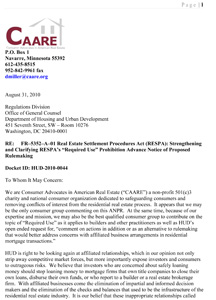In this letter to HUD we point out the problems with what the builders are doing as well as Affiliated Business Arrangements (AfBA’s) in general. And we do so from a different perspective – from that of the consumer. In fact, CAARE may be the only consumer group that chimed in among the thousand or so comment letters submitted by industry participants.
AfBA’s in real estate are not like One Stop Shopping at Target, yet the industry commonly disarms the public by calling these dangerous relationships just that. We believe that a more appropriate name for these widely used arrangements should be “One Stop Robbing,” or “Sophisticated Captured Audience Marketing” (S.C.A.M.). Our letter explains why these arrangements are so bad for the consumer and our economy.
But what builders are doing in order to force consumers to use their affiliated mortgage and title services is reprehensible. And that is the main topic of HUD’s request for comments on their Advanced Notice of Proposed Rule making. Sure consumers pay higher closing costs and interest rates when they are steered into builders’ AfBA’s. But what about the loss of safeguards that can only come from impartial decision makers? If the builder owns the title company can they really be expected to call out a major title defect on their property and cancel their own closing? What type of confidence do such arrangements in still in the residential real estate market?
In our letter we discuss the problem and show just how far home builders will go to trick consumers to buy their houses. We even attach as exhibits some of the secret solicitations some of the builders sent directly to the home buyers’ Realtors seeking to bribe buyers’ Realtors with offers of bonuses (on top of their commissions) as high as $4000 and even a free Lexus. We also point out the hypocritical view the National Association of Realtors takes by comparing the letter they wrote last month to a cite they include in their letter to HUD this month. Can they really be trusted to provide our media with housing statistics if their own President can’t get her facts straight?
If you want to help by either volunteering or donating much needed support, please e-mail me or click on the donate button on our website in the upper right hand corner. We are all volunteer non-profit 501(c)3 charity organization that gets all its funding from the public.
Just click on the image below to read the letter. Thanks!






